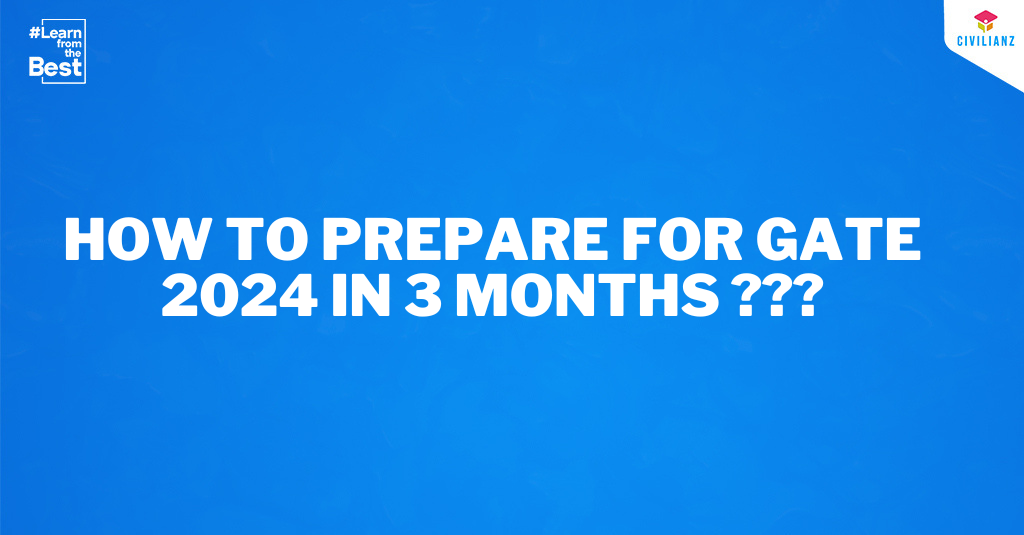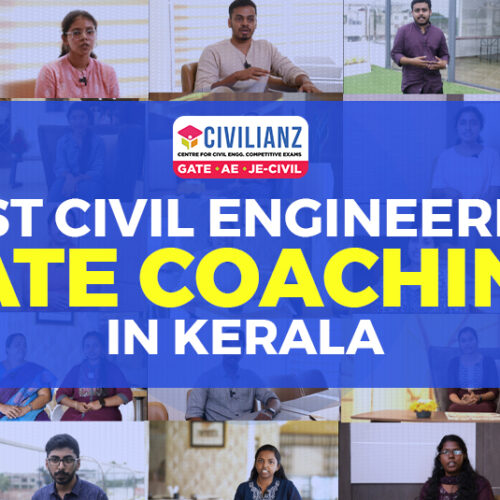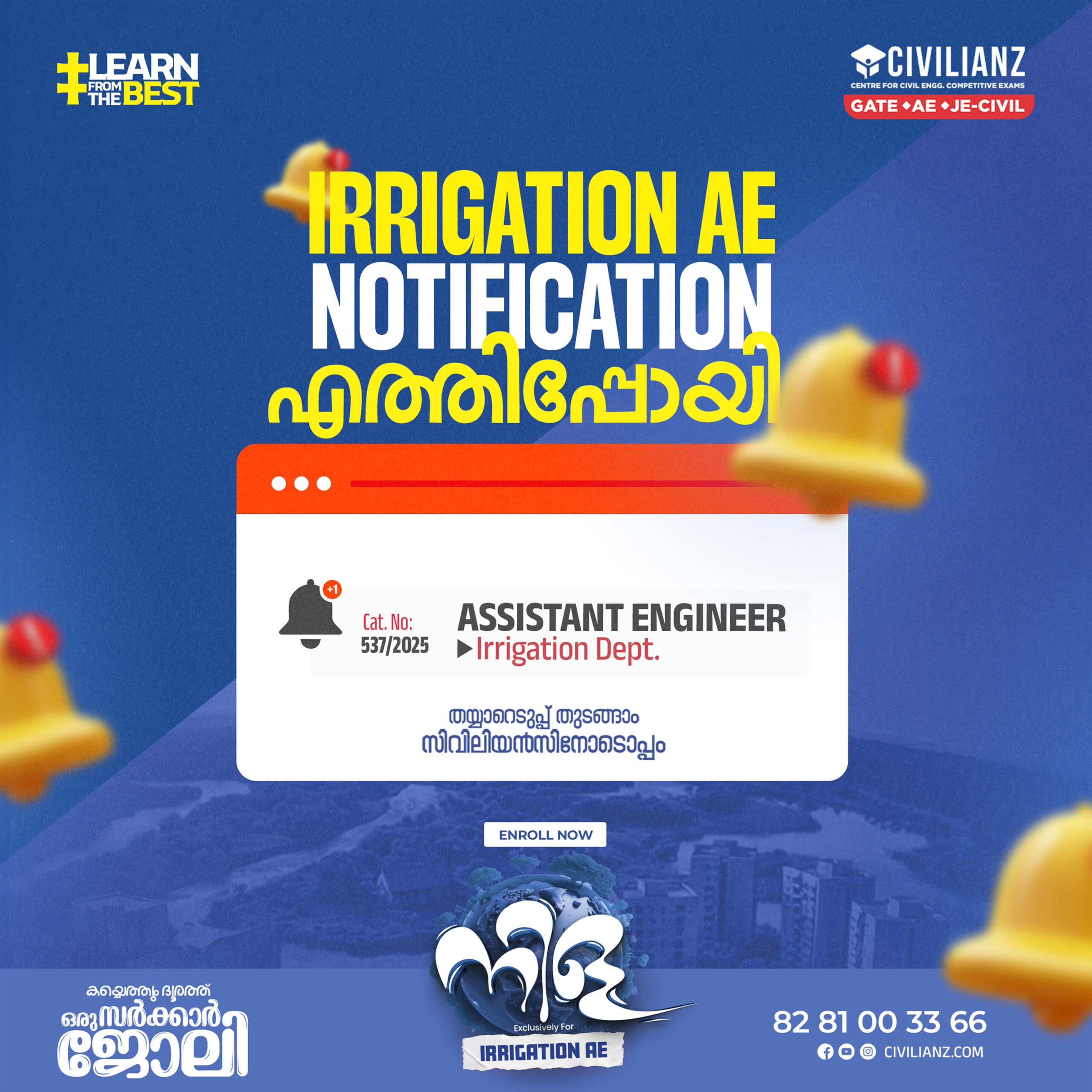
HOW TO PREPARE FOR GATE 2024 IN 3 MONTHS ?
The Graduate Aptitude Test in Engineering (GATE) is a nationwide examination that is collaboratively organized by the Indian Institute of Science (IISc), Bengaluru, along with seven Indian Institutes of Technology (IIT Bombay, IIT Delhi, IIT Guwahati, IIT Kanpur, IIT Kharagpur, IIT Madras, and IIT Roorkee) on behalf of the National Coordination Board (NCB)-GATE, Department of Higher Education, Ministry of Education (MoE), Government of India.
GATE is administered in a computer-based format (CBT) and assesses candidates’ comprehensive understanding of a wide range of undergraduate subjects in Engineering, Technology, Science, and Architecture, as well as both undergraduate and post-graduate level subjects in Humanities and Science. GATE 2024 will include 30 different test papers, spread out over four days. The examination dates for GATE 2024 are scheduled for February 3, 4, 10, and 11, 2024. This examination will be conducted in multiple cities across India and will not be held in centers located outside of India.
ELIGIBILITY
| Degree/Program | Qualifying Degree/Examination | Description of Eligible Candidates |
| B.E./B.Tech | Bachelor’s degree in Engineering / Technology (4 years after 10+2 or 3 years after B.Sc./ Diploma in Engineering/Technology) |
Currently in the 3rd year or higher or already completed |
SYLLABUS AND PATTERN OF EXAM
The basic syllabus and exam pattern of GATE 2024 are the important elements that you need to be familiar with while starting off your preparation. While the exam pattern will give you an idea about how the examination will be conducted, GATE 2024 syllabus will allow you to know what are the topics and units which have to be studied. This will help in coordinating the schedule for the entire preparation period. GATE SYLLABUS
Section 1: Engineering Mathematics
Linear Algebra: Matrix algebra; Systems of linear equations; eigen values and eigen vectors.
Calculus: Functions of single variable; Limit, continuity and differentiability; Mean value theorems, local maxima and minima; Taylor series; Evaluation of definite and indefinite integrals, application of definite integral to obtain area and volume; Partial derivatives; Total derivative; Gradient, Divergence and Curl, Vector identities; Directional derivatives; Line, Surface and Volume integrals.
Ordinary Differential Equation (ODE): First order (linear and non-linear) equations; higher order linear equations with constant coefficients; Euler-Cauchy equations; initial and boundary value problems.
Partial Differential Equation (PDE): Fourier series; Separation of variables; solutions of one- dimensional diffusion equation; first and second order one-dimensional wave equation and two-dimensional Laplace equation.
Probability and Statistics: Sampling theorems; Conditional probability; Descriptive statistics – Mean, median, mode and standard deviation; Random Variables – Discrete and Continuous, Poisson and Normal Distribution; Linear regression.
Numerical Methods: Error analysis. Numerical solutions of linear and non-linear algebraic equations; Newton’s and Lagrange polynomials; numerical differentiation; Integration by trapezoidal and Simpson’s rule; Single and multi-step methods for first order differential equations.
Section 2: Structural Engineering
Engineering Mechanics: System of forces, free-body diagrams, equilibrium equations; Internal forces in structures; Frictions and its applications; Centre of mass; Free Vibrations of undamped SDOF system.
Solid Mechanics: Bending moment and shear force in statically determinate beams; Simple stress and strain relationships; Simple bending theory, flexural and shear stresses, shear centre; Uniform torsion, Transformation of stress; buckling of column, combined and direct bending stresses.
Structural Analysis: Statically determinate and indeterminate structures by force/ energy methods; Method of superposition; Analysis of trusses, arches, beams, cables and frames; Displacement methods: Slope deflection and moment distribution methods; Influence lines; Stiffness and flexibility methods of structural analysis.
Construction Materials and Management: Construction Materials: Structural Steel – Composition, material properties and behaviour; Concrete – Constituents, mix design, short-term and long-term properties.
Construction Management: Types of construction projects; Project planning and network analysis – PERT and CPM; Cost estimation.
Concrete Structures: Working stress and Limit state design concepts; Design of beams, slabs, columns; Bond and development length; Prestressed concrete beams.
Steel Structures: Working stress and Limit state design concepts; Design of tension and compression members, beams and beam- columns, column bases; Connections – simple and eccentric, beam-column connections, plate girders and trusses; Concept of plastic analysis -beams and frames.
Section 3: Geotechnical Engineering
Soil Mechanics: Three-phase system and phase relationships, index properties; Unified and Indian standard soil classification system; Permeability – one dimensional flow, Seepage through soils – two – dimensional flow, flow nets, uplift pressure, piping, capillarity, seepage force; Principle of effective stress and quicksand condition; Compaction of soils; One- dimensional consolidation, time rate of consolidation; Shear Strength, Mohr’s circle, effective and total shear strength parameters, Stress-Strain characteristics of clays and sand; Stress paths.
Foundation Engineering: Sub-surface investigations – Drilling bore holes, sampling, plate load test, standard penetration and cone penetration tests; Earth pressure theories – Rankine and Coulomb; Stability of slopes –Finite and infinite slopes, Bishop’s method; Stress distribution in soils – Boussinesq’s theory; Pressure bulbs, Shallow foundations – Terzaghi’s and Meyerhoff’s bearing capacity theories, effect of water table; Combined footing and raft foundation; Contact pressure; Settlement analysis in sands and clays; Deep foundations – dynamic and static formulae, Axial load capacity of piles in sands and clays, pile load test, pile under lateral loading, pile group efficiency, negative skin friction.
Section 4: Water Resources Engineering
Fluid Mechanics: Properties of fluids, fluid statics; Continuity, momentum and energy equations and their applications; Potential flow, Laminar and turbulent flow; Flow in pipes, pipe networks; Concept of boundary layer and its growth; Concept of lift and drag.
Hydraulics: Forces on immersed bodies; Flow measurement in channels and pipes; Dimensional analysis and hydraulic similitude; Channel Hydraulics – Energy-depth relationships, specific energy, critical flow, hydraulic jump, uniform flow, gradually varied flow and water surface profiles.
Hydrology: Hydrologic cycle, precipitation, evaporation, evapo-transpiration, watershed, infiltration, unit hydrographs, hydrograph analysis, reservoir capacity, flood estimation and routing, surface run-off models, ground water hydrology – steady state well hydraulics and aquifers; Application of Darcy’s
Law. Irrigation: Types of irrigation systems and methods; Crop water requirements – Duty, delta, evapo-transpiration; Gravity Dams and Spillways; Lined and unlined canals, Design of weirs on permeable foundation; cross drainage structures.
Section 5: Environmental Engineering
Water and Waste Water Quality and Treatment: Basics of water quality standards – Physical, chemical and biological parameters; Water quality index; Unit processes and operations; Water requirement; Water distribution system; Drinking water treatment. Sewerage system design, quantity of domestic wastewater, primary and secondary treatment. Effluent discharge standards; Sludge disposal; Reuse of treated sewage for different applications.
Air Pollution: Types of pollutants, their sources and impacts, air pollution control, air quality standards, Air quality Index and limits.
Municipal Solid Wastes: Characteristics, generation, collection and transportation of solid wastes, engineered systems for solid waste management (reuse/ recycle, energy recovery, treatment and disposal).
Section 6: Transportation Engineering
Transportation Infrastructure: Geometric design of highways – cross-sectional elements, sight distances, horizontal and vertical alignments. Geometric design of railway Track – Speed and Cant.
Concept of airport runway length, calculations and corrections; taxiway and exit taxiway design.
Highway Pavements: Highway materials – desirable properties and tests; Desirable properties of bituminous paving mixes; Design factors for flexible and rigid pavements; Design of flexible and rigid pavement using IRC codes.
Traffic Engineering: Traffic studies on flow and speed, peak hour factor, accident study, statistical analysis of traffic data; Microscopic and macroscopic parameters of traffic flow, fundamental relationships; Traffic signs; Signal design by Webster’s method; Types of intersections; Highway capacity.
Section 7: Geomatics Engineering
Principles of surveying; Errors and their adjustment; Maps – scale, coordinate system; Distance and angle measurement – Levelling and trigonometric levelling; Traversing and triangulation survey; Total station; Horizontal and vertical curves.
Photogrammetry and Remote Sensing – Scale, flying height; Basics of remote sensing and GIS.
GATE EXAM PATTERN 2023
Particulars |
Details |
GATE 2024 exam mode |
Computer Based Test (CBT) [will be conducted at select centers in select cities] |
| GATE 2024 exam duration | 3 Hours |
| Number of Subjects (Papers) | 30 |
| Sections | General Aptitude (GA) + Candidate’s Selected Subject(s) |
| Type of Questions | (a) Multiple Choice Questions (MCQ) (b) Multiple Select Questions (MSQ) and/or (c) Numerical Answer Type (NAT) Questions |
| Questions for testing these abilities | (a) Recall (b) Comprehension (c) Application (d) Analysis & Synthesis |
| Number of Questions | 10 (GA) + 55 (subject) = 65 Questions |
| Distribution of Marks in all Papers | General Aptitude: 15 Marks + Engineering Mathematics**: 13 Marks + Subject Questions: 72 Marks = Total: 100 Marks (**XE includes Engineering Mathematics section XE-A of 15 Marks) |
| Marking Scheme | Questions carry 1 mark and 2 marks |
| Negative Marking | For a wrong answer chosen in a MCQ, there will be negative marking. For 1-mark MCQ, 1/3 mark will be deducted for a wrong answer. Likewise, For 2-mark MCQ, 2/3 mark will be deducted for a wrong answer. No negative marking for MSQ or NAT questions. |
GATE 2024 CUT OFF MARKS
The release of cut-off marks for GATE 2024 will occur after the online exam has been conducted. There are two categories of cut-offs, namely the Qualifying Cut-Off and the Admission Cut-Off, which are detailed below:
-
GATE Qualifying Cut-Off: These represent the minimum scores that candidates must attain to qualify for the examination. Subject-specific cut-offs are also established. The GATE qualifying cut-off will be published by the organizing authority.
-
GATE Admission Cut-Off: This particular cut-off is determined by individual institutes and is contingent on factors such as the number of available seats, the volume of applicants, applicant categories, and so on
GATE STUDY MATERIALS
Study material and reference book for the GATE exam plays a dominant role in your exam preparation. If you are studying by self-preparation, apart from your UG study material, try collecting standard textbooks for each subject and start your work, but mind you, textbooks are vast and not filtered according to the gate requirement. This method of study will be successful, but it consumes more than double time you spend in CIVILIANZ, because a coaching institute provides classes to maximum precision and to the point for GATE.
Now let us explain about a systematic coaching, this is highly recommended because everything needed for GATE is provided in plate, what to study, what not to study, which subject to focus, which chapter should be concentrated more, which one should be left, chapter wise mock test, subject wise mock test, complete mock test, literally everything related to GATE preparation comes under one umbrella. So in CIVILIANZ, there is no necessity to study text books, that would be recommended only when you have done the rest of things right. This simply means, by studying CIVILIANZ materials along with regular attendance in our class, cracking gate will be a piece of cake.
Tips and tricks to follow while preparing for GATE
This exam, there will be plenty of things to remember like lots and lots of formulae, standard values, concepts and so on. Following are the tips and tricks to follow while doing GATE preparation
- Mix up the distinct subjects while you study. Don’t try to complete one subject and then move to other and then another. Study multiple subjects at a time
- Keep keynotes and sticky notes across your study room with important formulae and standard values, this will help you in easy remember
- Prepare notes in such a way that you use multiple colour inks to write. This helps in catching the important point quickly especially when you revise.
- Attend chapter-wise as well as subject-wise mock tests along with your preparation and don’t wait for finishing up the studies and then writing test. Attend tests along with your study. An overall mock test can be kept at last.
- Regularly interact with fellow competitors, especially the one who works harder and the one’s who you think are the rank makers
”
TARGET GATE 2024
Civilianz presents Target GATE Intensive Course for students with a well-rounded and structured approach to GATE preparation through online resources and support. It equips students with the knowledge, skills, and confidence needed to excel in the GATE exam, making it an ideal choice for those aspiring to pursue postgraduate studies in engineering and related fields while benefiting from the convenience of online learning.
-
Live Classes (6:00 PM to 9:00 PM): Live classes during these evening hours provide students with an opportunity to interact with instructors in real-time. It allows for immediate clarification of doubts, active participation, and engagement. This is particularly important for complex subjects as it promotes a deeper understanding of the topics.
-
Recorded Classes Covering Full Syllabus: Having recorded classes available ensures that students can revisit and review the content at their own pace. This is especially beneficial for subjects with high weightage as it allows for in-depth study and revision, ensuring that no part of the syllabus is left unaddressed.
-
Videos and Assessment Tests: Video lectures can make complex topics more understandable. Combining video content with assessment tests helps gauge the students’ grasp of the subject matter. Regular quizzes or tests after each topic or module can reinforce learning and identify areas that require additional attention.
-
Regular Model Tests: Regular model tests are essential to assess the overall progress of students. These tests simulate the actual exam conditions and help students manage their time, practice problem-solving, and build confidence. For high-weightage subjects, the focus on these tests is vital.
-
GATE Test Series: A GATE test series is invaluable for students preparing for the GATE examination. These tests closely resemble the actual GATE exam in terms of difficulty, format, and time constraints. They help students identify their strengths and weaknesses and fine-tune their strategies for the real exam.
-
Comprehensive GATE Study Material eBook: Providing a comprehensive GATE study material eBook is a fantastic resource. It should cover the entire syllabus in detail, including high-weightage subjects. This eBook should be structured, easy to navigate, and serve as a reference guide for students.
Civilianz stands as the top GATE coaching center in Kerala, specializing in preparing students for various Civil Engineering Competitive exams. Our comprehensive coaching program covers a range of exams, including GATE – Civil, Assistant Engineer, Assistant Professor Civil, Lecturer in Polytechnic, Junior Engineer- Civil, Overseer, Tracer, and other similar civil engineering competitions.
GATE 2024 – Civil പരീക്ഷയ്ക്ക് ഇനി ചുരുങ്ങിയ സമയം മാത്രം ⏰
ഇനിയുള്ള ദിവസങ്ങളിൽ smart ആയി, effective ആയി കൃത്യമായ strategies follow ചെയ്ത് പഠിക്കാനായി Civilianz ന്റെ Intensive Online Crash Course 📚
Course features
✅ Examination point of view ൽ weightage കൂടിയ subjects ന്റെ live class from 6.00 pm to 9.00 pm
✅ Full Syllabus cover ചെയ്യുന്ന രീതിയിൽ എല്ലാ വിഷയങ്ങളുടെയും recorded classes
✅ ഓരോ വീഡിയോ ക്ലാസിനോടൊപ്പവുമുള്ള Assessment tests
✅ Regular Model Tests
✅ GATE Test series
✅ Comprehensive GATE Study material – e book
A journey of thousand miles begins with a single step ✨
കൂടുതൽ വിവരങ്ങൾക്ക് contact ചെയ്യാം 👇🏻
📱8281003366
CIVILIANZ SOCIAL MEDIA PLATFORMS
Our Social media platforms are exclusively for Civil Engineering students, job candidates, teachers and all those who have passion for Civil Engineering.
You will get
-
Civil engineering quiz and rewards
-
Regular job notifications
-
Exam notifications
-
PDF notes
-
Study tips
-
Civil related discussion and all in this group.
JOIN OUR SOCIAL MEDIA PLATFORMS
#learnfromthebest










Leave a comment